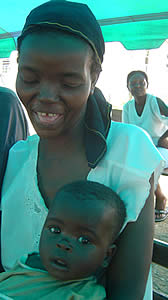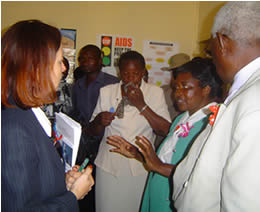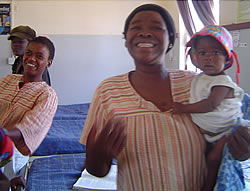|
Back to Index
CIDA
supports ZVITAMBO HIV and AIDS Prevention and Care for Mothers and
Children Programme
Taurai
Maduna, Kubatana.net
October 23, 2006
 |
| Lucia
Tsvangira and her six-month baby Chido © Kubatana.net |
 Courageous
Lucia Tsvangira and her six-month baby Chido sit peacefully under
a tent at Chirumanzu District Hospital 200km from Harare, as speaker
after speaker take to the podium at the launch of the second phase
of the ZVITAMBO
Aids and Prevention Program in Zimbabwe. In between speeches, Rutendo
Mandizvidza (7 years) and Tinoteda Manhovo (11 years) steal the
limelight reciting poems on HIV and AIDS amidst cheers and ululations
from people gathered around. Courageous
Lucia Tsvangira and her six-month baby Chido sit peacefully under
a tent at Chirumanzu District Hospital 200km from Harare, as speaker
after speaker take to the podium at the launch of the second phase
of the ZVITAMBO
Aids and Prevention Program in Zimbabwe. In between speeches, Rutendo
Mandizvidza (7 years) and Tinoteda Manhovo (11 years) steal the
limelight reciting poems on HIV and AIDS amidst cheers and ululations
from people gathered around.
Finally
it was Lucia's time to speak and paying no heed to protocol, she
recounts in her local language about how she went to the voluntary
HIV and counselling testing centre after becoming pregnant. After
her test she was told that she was HIV positive and was encouraged
to seek for help from ZVITAMBO.
ZVITAMBO is a
Harare based organisation that provides technical and material support
for HIV care and prevention services for women and children in 14
rural mission hospitals. The organisation is affiliated with the
University of Zimbabwe, the Research Institute of the McGill University
Health Centre in Canada, and The Johns Hopkins Bloomberg School
of Public Health in the United States.
Lucia is one of more than 25 000 rural women who have benefited
from the first phase of the ZVITAMBO HIV and AIDS Prevention Programme
for Mothers and Children. The Government of Canada through the Canadian
International Development Agency (CIDA) is supporting the second
phase of the programme.
Speaking at the
official launch of the second phase, Ms Roxanne Dube, Canada's Ambassador
to Zimbabwe said the work being done by ZVITAMBO was important because
"they provide an accessible entry point of services on HIV/AIDS".
 |
| Canada's
Ambassador to Zimbabwe, Roxanne Dubé is shown around
Chirumanzi District Hospital © Kubatana.net |
 She
added that as recognition of the "importance and effectiveness"
of their work, CIDA had approved the second phase of the ZVITAMBO
HIV and AIDS Prevention and Care for Mothers and Children to the
total amount of $CAD2.4 million. She
added that as recognition of the "importance and effectiveness"
of their work, CIDA had approved the second phase of the ZVITAMBO
HIV and AIDS Prevention and Care for Mothers and Children to the
total amount of $CAD2.4 million.
Dr Alison Jenkins
from ZVITAMBO said her organisation had been overwhelmed by the
enthusiasm and professionalism of the District Administration and
the Provincial and District Health Executive and hoped that the
partnership would, "extend and strengthen PMTCT".
She added that while ZVITAMBO had been focusing more on mothers,
there was a need to become broader and create "HIV friendly and
supportive communities - free of denial, blame and ignorance. All
partners need to work together to bring about this goal."
 |
| Mothers
in the Chirumanzu District Hospital pose for a photograph ©
Kubatana.net |
 Naomi
Tawengwa is the co-ordinator of ZVITAMBO. She said women like Lucia
Tsvangira who knew about their HIV status where in a better position
to live longer and more fulfilling lives. Naomi
Tawengwa is the co-ordinator of ZVITAMBO. She said women like Lucia
Tsvangira who knew about their HIV status where in a better position
to live longer and more fulfilling lives.
She added that her organisation was keen on promoting the family
approach, where people talk openly on issues to do with HIV and
AIDS. "In Shona culture it is taboo to talk about sex but it's something
we want to promote."
Despite the great
work that ZVITAMBO is doing to assist the rural community, those
tested positive like Lucia are still waiting in vain for free Anti
Retroviral drugs (ARV's). According to The Standard, more than 35
HIV/Aids activists stormed the National Aids Council headquarters
in Harare demanding that the organisation make a written undertaking
to provide the life-prolonging Anti-Retroviral drugs to more than
600 000 people. The activists are quoted as saying; "We will not
stand and watch while our brothers and sisters die in pain at home
with not even a cent for painkillers."
Background to ZVITAMBO
ZVITAMBO was formed in Harare in 1996 as a clinical trial designed
to determine whether there were benefits in giving a single oral
dose of vitamin A to mothers and newborns, in terms of reducing
mother-to-child HIV transmission during the breastfeeding period,
reducing infant mortality and reducing new HIV infections in women.
It was found that the doses of vitamin A had no overall effect
on these outcomes, but other findings, particularly those related
to safer breastfeeding, have been very important and have contributed
towards influencing PMTCT policy and improving PMTCT programs both
in Zimbabwe and around the world.
At its height,
175 Zimbabweans worked on this clinical trial in Harare, with follow
up of the over 14,000 mothers and babies extending to all parts
of Zimbabwe. As this follow up drew to a close in 2001, several
key ZVITAMBO staff members - some of whom are here with us today
- wanted to apply what they had learned about PMTCT to benefit their
people. These were the early days of PMTCT. Source - Dr Alison
Jenkins, ZVITAMBO
Visit the Kubatana.net
fact
sheet
Please credit www.kubatana.net if you make use of material from this website.
This work is licensed under a Creative Commons License unless stated otherwise.
TOP
|

